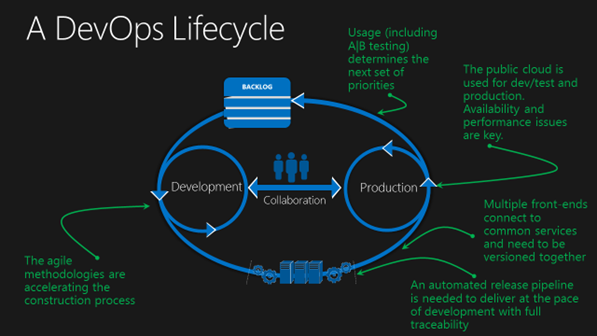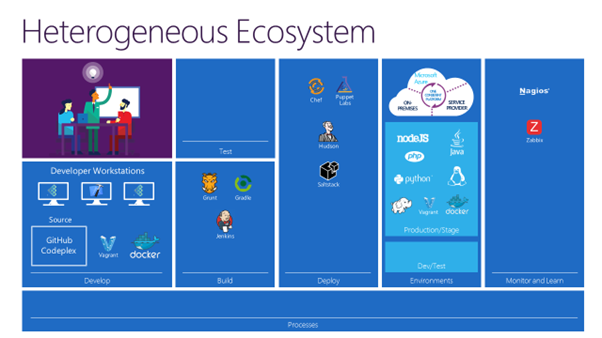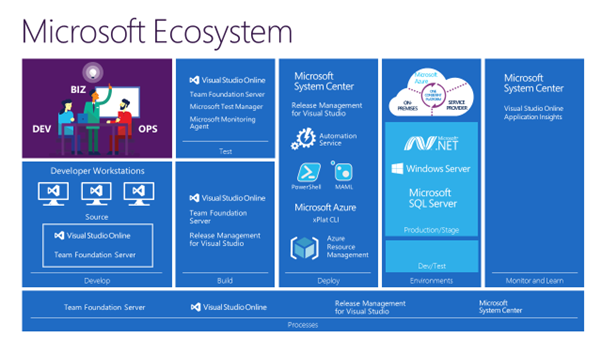What is DevOps?
 Susan Smith, IT Pro Technical Evangelist at Microsoft
Susan Smith, IT Pro Technical Evangelist at Microsoft
DevOps is not a new thing but it is a great thing. As an emerging trend that promises to increase the flow of value to customers, DevOps is becoming an essential part of IT and Business Transformation. It will change the way you work in terms of People, Process and Tools. Forever.
This is the first in a series of articles exploring the concept of DevOps, its evolution and adoption within the Enterprise, and what you can do to equip yourself in this Brave New DevOps World.
What is DevOps?
DevOps is the Missing Link between Developers & Operations.
DevOps blurs the boundaries between the guys who create applications (Dev): and those guys who deploy the application into production and look after it on a day-to-day basis (Ops). Not so long ago, Dev would create the app and sent it to Ops to deploy, often with minimal instructions. Ops had the task of making it work without breaking anything else in the live environment. This relationship between Dev & Ops was more of a continuum or one-way street, which often caused delays in go-live or the detection of bugs that had not been encountered before. By bridging the gap between Dev & Ops, via better communication and collaboration, the Whole truly becomes greater than the sum of its parts. This short video explains how.
DevOps is extending the conversations the industry has been having around Application Lifecycle Management (ALM) and Agile methodologies, as illustrated below:
There are a number of different elements that work together in DevOps practices, such as Continuous Delivery, Availability, Performance Monitoring and Usage Monitoring, to achieve the ultimate in continuous improvement.
Why you should care
Ten years ago, the tenuous relationship between Dev and Ops wouldn’t have been such a great issue. With app deployment lifecycles shortening and continuous delivery and improvement becoming part of a Company’s Vision, there needs to be a better way of doing things. There are compelling argument for DevOps – those organisations that have implemented it saw the following benefits:
- Ship code 30 times fast and complete those deployments 8,000 times faster than their peers
- Have 50% fewer failures and restore service 12 times faster than their peers
- Improved Quality of Software Deployments
- More Frequent Software Releases
- Improved visibility into IT Process and Requirements
- Cultural Change Collaboration Co-operations
- More responsiveness to Business Needs
- More Agile Development
- More Agile Change Management Process
- Improved Quality of Code
As an enterprise organization you want to understand the practices that you can use to improve your performance. To transform to the faster, continuous cadence of value delivery, an enterprise needs to adopt modern (ALM) Agility and DevOps practices.
Enterprises need to:
- Adopt agility while delivering with quality. These practices will extend throughout the full development lifecycle - from plan, through develop (including test), to release and operate in production.
- Scale to meet larger volume and variety of data, while sustaining application performance and reliability with integrated DevOps processes
- Continuous learning needs to occur throughout, to continually refine and improve both the development process and the applications being delivered. By employing integrated development and operational tools, an organisation will be enabled to operate in continuous build, measure, and learn cycles.
Open for Business
The Tools that are used within the DevOps Life Cycle can be a mixture of Open and Microsoft Tools. Containerisation is a huge area which will be covered in subsequent articles. The Heterogeneous Ecosystem as shown below, details examples of software that can be used for the different part of the DevOps Life Cycle:
Similarly, the Microsoft Ecosystem below shows which part of the Microsoft stack you can use within the DevOps Life Cycle:
You can mix and match the elements of each Ecosystem, and this will be discussed in subsequent articles in this DevOps series. Irrespective of which technologies you use, DevOps will enable you to:
- Shorten Cycle Times
- Optimise Resources
- Faster Detection
- Faster Root Cause Remediation
- Resilience
- Hypothesis-driven Process
In Summary (or Automation. Automation. Automation)
By using the Power of Repeatability, DevOps will transform how IT and your Business functions, facilitating speedier deployments and easy reversal if a rollback is deemed necessary. By vastly improving the quality, speed and efficiency of software deployments, IT will become more responsive to Business needs, being effective where it matters.
Next Steps
1. Register for Tech Days Online – I will be covering Containerisation on Day 2
2. Watch DevOps Session Tracks from Future Decoded here
3. Attend a Local DevOps Meetup. Register at Meetup and Find (or start) a DevOps Meetup near you. This is regularly becoming a requirement within Job Specs posted on LinkedIn Meetups - discuss joys & benefits of this - also - this is becoming a requirement within Job Specs posted on LinkedIn. Here’s some to get you started…..
e. Leeds DevOps
4. Join DevOps Groups on LinkedIn. Here’s some great resources to get you started:
a. DevOps
d. DevOps (AWS, Azure, Docker, Chef, Puppet, Salt, Ansible) Discussions
6. Microsoft Virtual Academy – DevOps Online Training
7. Read Gene Kim’s The Phoenix Project: A Novel about IT, DevOps, and Helping Your Business
8. Explore Docker



